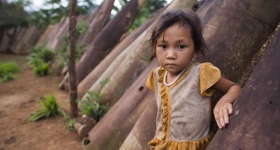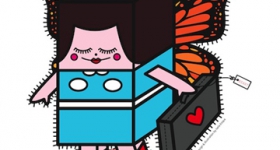ON HER ANNUAL TRIPS to India as a child, Asra Nomani had the drill down pat: enter the aircraft in jeans but change into traditional clothes in the tiny lavatory. Always wear loose clothes and always, always cover your behind. But it wasn't only her clothes Nomani was used to switching identities as well. What she didn't realize then was that it was something she would later confront as a writer and activist.
"Growing up in West Virginia, I would never tell people I was Muslim," Nomani says. "I never identified myself as one. When I was asked out on a date in junior high, all I said was that I wasn't allowed to date."
In deference to her parents-who grew up in traditional gender roles-she studied at nearby West Virginia University. Even though they were traditional, Nomani says her parents were willing to push the envelope when it came to their children.
So after college, Nomani went on to pursue her master's at American University in Washington, D.C. and get a job with the Wall Street Journal. What started as an article about the American fad to study Tantric spirituality led Nomani from Santa Cruz to India and Pakistan writing about the intersections of faith, which would be captured in her first book Tantrika.
While Nomani was never a religious person, she believes that two events-the death of friend and colleague Daniel Pearl and the birth of her son out of wedlock-led to an exploration of her faith.
"When Danny was murdered, I recited the dua: 'Khul-hu-allahu ahad,' which my mother taught me to say when you have a nightmare. When I was delivering Shibli, I kept saying 'Allah-hu'. All this when I was in my late 30s and I realized that I couldn't run away from my faith; it's in my blood."
But she did have a choice: "I could either hate my religion as people around the world did or I could find a way to make it compatible in my life."
Nomani was poised at the cusp of the biggest contradiction of her life. While she loathed the way Islam was expressed in the world, she could see how her parents lived as good Muslims and how Islam could be a rejuvenating force.
So, with faith in her heart and a chasm to cross, she set off on the holy pilgrimage to Mecca, the Hajj, to learn more about her religion. While for most people the Hajj is the ultimate expression of their faith, for Nomani it was just the beginning. She returned invigorated, having learned about the strength of Muslim women throughout history. She now had the courage to campaign for an inclusive faith.
"My experiences in Karachi taught me that the personal is political. I had lost a friend in a political act. As an unwed mother, I was considered a criminal and by Islamic law, subject to zina (death by stoning)" she says. "Not everyone can engage with their faith in a public way. You have to have the motivation and the desire. For me, that motivation and desire arose out of Danny's murder and Shibli's conception."
Nomani began to champion the rights of women at her Morgantown, W.V. mosque, first by praying in the same room as men and later as part of the first mixed-gender prayer in her mosque. But she had to carry the message further and writing was her tool.
"In my writings, I didn't want there to be any skeletons in my closet. I couldn't pretend, for instance, that I hadn't had sex," she says with disarming candor. The story of her journey towards Islam was published in Standing Alone in Mecca: An American Woman's Struggle for the Soul of Islam.
Of course, writing from an insider's perspective has not been without challenges. Nomani has received everything from hate mail to death threats. "You know, I got the meanest email the other day, where this man called me and Shibli names. So I wrote him a line I learnt at my son's preschool: ? wish you well.' I don't take these attacks personally," she says.
Nomani was recently awarded a South Asian Journalists Association reporting fellowship to examine the women's jihad movement in India. Her itinerary includes meeting with Daud Sharifa, who heads a movement to build an all-women's mosque, and interviewing Asghar AIi Engineer, who is grooming a woman to be a jurist. She says that when she started her quest for a true, progressive Islam, she didn't believe there was a single person who thought like her. But she found many kindred souls.
"At the Islamic feminist conference in Barcelona, I met so many people who are working to challenge the traditional interpretation of Islam. I want to codify all that into a progressive interpretation and showcase all the hard work people are doing from Lucknow to Indonesia, so that a 25-year-old Muslim girl in New York doesn't think she will go to hell for marrying a Catholic. I want to convey these ideas and make them accessible to these people," she says.
It's been six years of soul-searching, and at times a gutwrenching journey. But Nomani, who once shied away from telling people she was Muslim, now identifies firmly by her religion. "Now I like telling people that I am Muslim, I want to shatter their stereotypes and preconceived notions and show them that there are people fighting for change."
Sadaf Siddique is a freelance writer based in Belmont, CA.









Comments